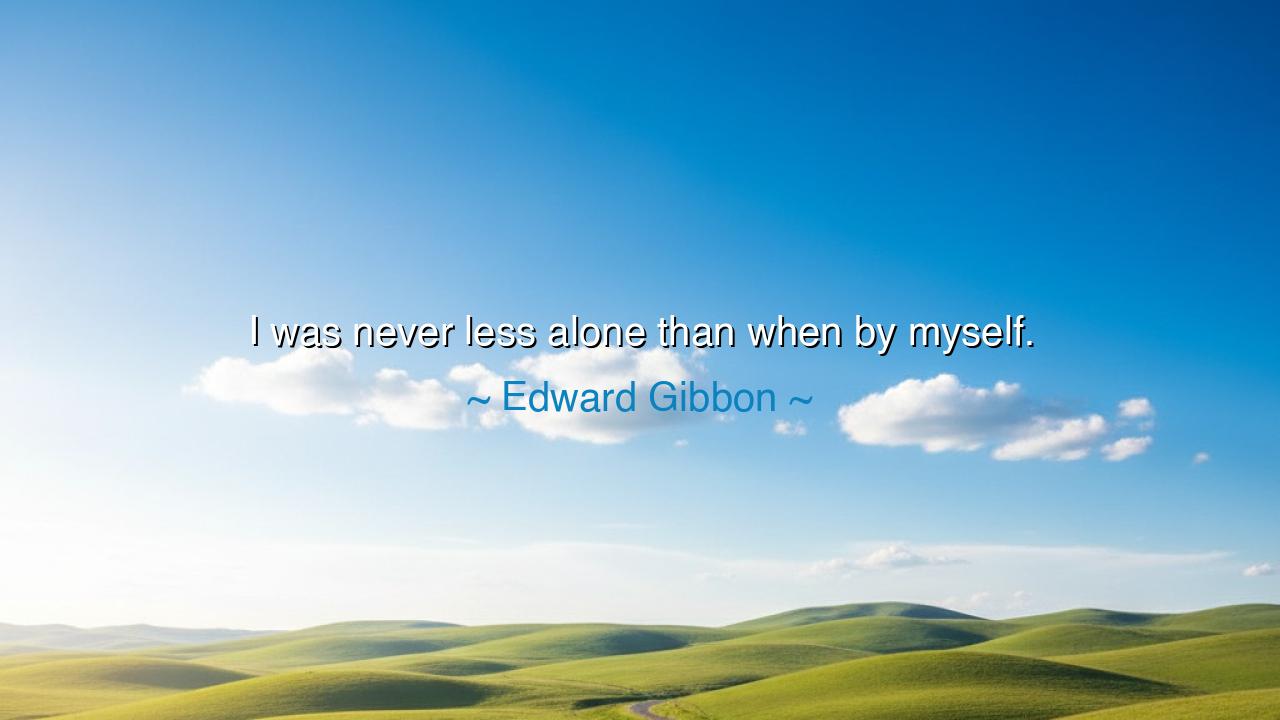
I was never less alone than when by myself.






"I was never less alone than when by myself." These words from Edward Gibbon, the historian of the fall of the Roman Empire, reveal a profound truth about solitude and inner peace. In a world where companionship and social validation are often seen as essential to human well-being, Gibbon's reflection offers an alternative perspective: that true connection comes not from others, but from within. In moments of solitude, free from the distractions and expectations of the world, Gibbon found that he was most at peace with himself. This quote speaks to the power of solitude—not as a form of loneliness, but as a space for self-discovery, introspection, and personal clarity.
Throughout history, the greatest minds have often found their most profound insights in moments of solitude. Socrates, though known for his public dialogues, frequently emphasized the importance of self-examination. He would retreat from the bustle of Athens to reflect on his thoughts and refine his understanding of virtue. His famous dictum, "Know thyself," implies that the greatest knowledge is not learned from external sources but found in the stillness of one's own mind. Similarly, Plato’s Academy was built on the belief that knowledge arises from inner contemplation, not the chaos of external affairs. In this sense, Gibbon’s insight resonates deeply with the ancient philosophers—those who understood that solitude allows the mind to reconnect with its most authentic self.
Consider the story of Marcus Aurelius, the Roman Emperor and Stoic philosopher, who spent much of his life alone in thought, despite the pressures of ruling an empire. His personal reflections, written in his Meditations, reveal a man at peace with his solitude. He understood that, as a ruler, he could not always trust the opinions of others, nor could he rely on the fleeting approval of the people. It was in solitude that Marcus found the time to confront his own thoughts, align his actions with virtue, and find inner strength. Like Gibbon, Marcus Aurelius found that solitude provided a sanctuary where he could cultivate his own wisdom, unaffected by the noise of the world.
The tension between solitude and companionship is not new. In ancient Rome, philosophers like Seneca and Epictetus taught that inner peace is achieved not through the external companionship of others but through self-mastery. Seneca, though deeply embedded in Roman society, often sought solitude to focus on his writings and reflections. His letters encourage individuals to step back from the demands of society and recognize the importance of being at peace with oneself. For Seneca, true contentment did not lie in the company of others, but in the ability to govern one's own thoughts and emotions. Gibbon’s words echo this philosophy—solitude, when embraced, becomes a space for inner growth and freedom.
In a world that often equates companionship with happiness, Gibbon’s reflection challenges us to reconsider what it means to be truly connected. We live in an age of constant social media, where the illusion of connection is always at our fingertips. Yet, how often do we find ourselves surrounded by others and still feel alone? The superficial connections we make through technology or casual interactions rarely offer the depth and peace that can be found in solitude. Gibbon’s insight encourages us to seek depth within ourselves, to find solace in our own company, and to realize that the quiet spaces of our lives are not places of loneliness but of profound connection with our true selves.
The lesson here is simple but vital: solitude is not to be feared or avoided, but embraced as a means of self-discovery and clarity. In solitude, we are free from the noise and judgment of the world, and we can turn inward to confront our deepest thoughts and desires. Just as the ancient philosophers recognized the importance of reflection in moments of stillness, we too must learn to cultivate solitude in our own lives. The self-awareness and inner peace that arise from such moments are not just luxuries, but necessary for leading a balanced and fulfilled life.
In practical terms, we must make time for solitude in our modern, busy lives. This does not mean complete isolation but creating spaces for quiet reflection. Whether through meditation, journaling, or simply walking alone in nature, we must learn to embrace moments of stillness. It is in these moments that we connect most deeply with ourselves and gain clarity on the decisions and paths ahead. Gibbon’s words remind us that in embracing solitude, we can cultivate a deeper sense of purpose and understanding, free from the distractions that often cloud our vision.
In conclusion, Edward Gibbon’s reflection serves as a timeless reminder that solitude is not synonymous with loneliness, but with the potential for deep self-connection and inner growth. Just as the ancients understood that wisdom arises in quiet reflection, so too must we honor the moments of stillness in our own lives. Let us seek the peace that comes from being with ourselves, knowing that in those moments, we find our truest selves and the clarity to navigate the world. Solitude becomes not a place of isolation, but a sanctuary where we find the strength and wisdom to live fully.






AAdministratorAdministrator
Welcome, honored guests. Please leave a comment, we will respond soon